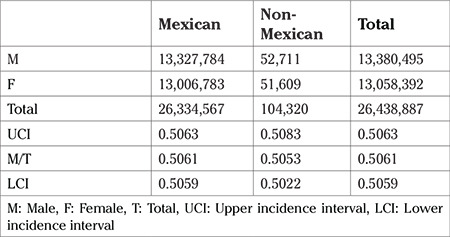墨西哥出生的墨西哥人和非墨西哥人之间没有出生性别比差异。
IF 1.2
Q3 OBSTETRICS & GYNECOLOGY
Journal of the Turkish German Gynecological Association
Pub Date : 2023-09-07
DOI:10.4274/jtgga.galenos.2023.2023-3-6
引用次数: 0
摘要
本文章由计算机程序翻译,如有差异,请以英文原文为准。

No birth sex ratio difference between Mexican and non-Mexican births in Mexico.
DOI: 10.4274/jtgga.galenos.2023.2023-3-6 Address for Correspondence: Victor Grech e.mail: victor.e.grech@gov.mt ORCID: orcid.org/0000-0002-3373-0478 Received: 06 April, 2023 Accepted: 25 May, 2023 To the Editor, The sex ratio at birth is expected to be approximately 0.515, calculated as male births divided by total births (M/T), thus a slight excess of males. Acute stress in the general population may cause M/T depressions, as evidenced by the M/T dip observed after the Great Recession of 2007 in the United States (1). Significant racial differences have been noted and attributed to innate and minor physiological differences, but chronic stress has been proposed as a possible cause (2). A recent paper showed that M/T was depressed in Mexico when compared to a global reference dataset (3,4). This study was carried out in order to ascertain whether Mexican M/T was similar to M/T in non-Mexican births in the same study cohort (4). Ethical approval was not required as data was comprised of free and anonymous datasets from the Instituto Nacional de Estadística y Geografía, Mexico’s National Institute of Statistics and Geography. For the same reason, informed consent was not obtained. Live births by sex, year and nationality [Mexican or non-Mexican (“Extranjero”)] were available for the period January 2010-December 2020. The equations of Fleiss (binomial) were used to calculate 95% confidence intervals (CI) for proportions. A bespoke Excel sheet was used to perform chi square tests. A p-value <0.05 was taken to represent a statistically significant result. Mexican and nonMexican births by sex, and M/T with 95% CIs are shown in Table 1. There was no significant M/T difference between the two groups. While racial disparities in M/T could theoretically be caused by innate physiological differences, it is also possible that the differences seen may be due to chronic stress (2). Support for this comes from a comparison of racial M/T in the United States which showed that M/T was higher in Whites than in American Indian/Alaska Native, and Black/African American births (5). This was probably due to the fact that in the United States, race remains the primary determinant of socioeconomic status and stress. This accords with the Trivers-Willard hypothesis of male foetal loss in this type of stress (2). This study indirectly supports the hypothesis that innate physiological differences do not appear to affect M/T, as there were no significant differences between the low Mexican M/T and non-Mexican M/T. However, the study was limited by small numbers and a lack of breakdown of what races or ethnicities constituted the non-Mexican births.
求助全文
通过发布文献求助,成功后即可免费获取论文全文。
去求助
来源期刊

Journal of the Turkish German Gynecological Association
OBSTETRICS & GYNECOLOGY-
CiteScore
2.40
自引率
7.10%
发文量
56
期刊介绍:
Journal of the Turkish-German Gynecological Association is the official, open access publication of the Turkish-German Gynecological Education and Research Foundation and Turkish-German Gynecological Association and is published quarterly on March, June, September and December. It is an independent peer-reviewed international journal printed in English language. Manuscripts are reviewed in accordance with “double-blind peer review” process for both reviewers and authors. The target audience of Journal of the Turkish-German Gynecological Association includes gynecologists and primary care physicians interested in gynecology practice. It publishes original works on all aspects of obstertrics and gynecology. The aim of Journal of the Turkish-German Gynecological Association is to publish high quality original research articles. In addition to research articles, reviews, editorials, letters to the editor, diagnostic puzzle are also published. Suggestions for new books are also welcomed. Journal of the Turkish-German Gynecological Association does not charge any fee for article submission or processing.
 求助内容:
求助内容: 应助结果提醒方式:
应助结果提醒方式:


